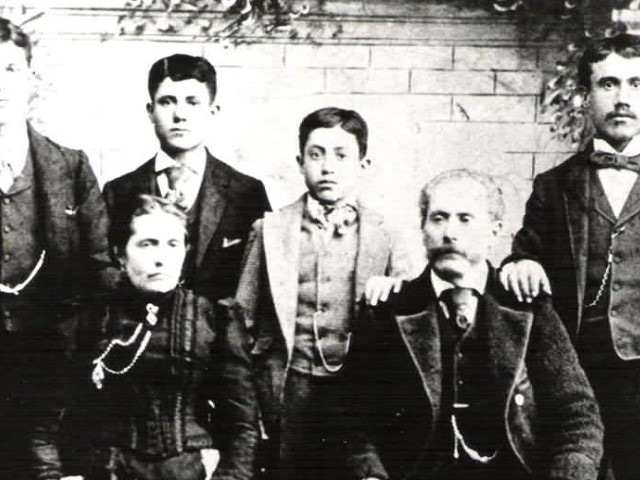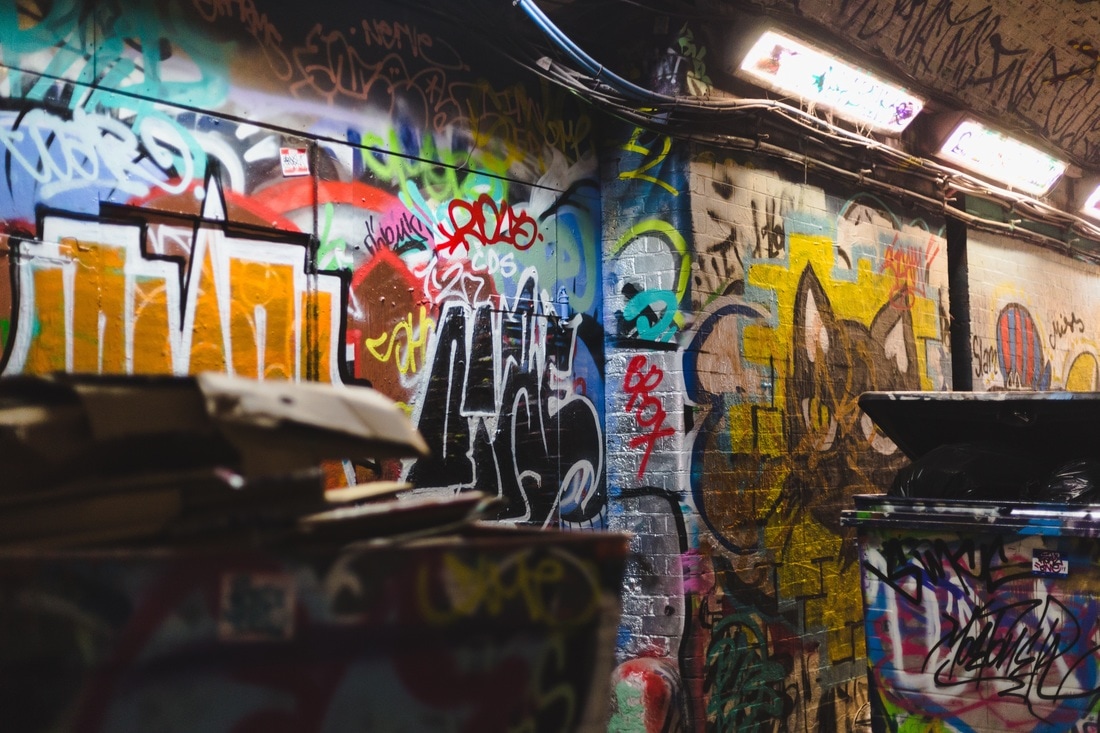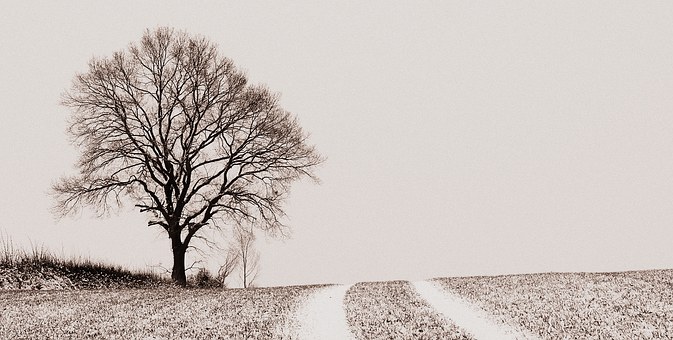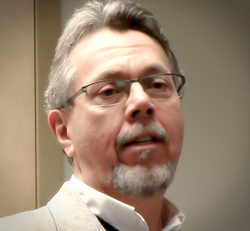|
I come from a family of immigrants. My maternal grandparents were both born in Italy. My grandfather Antonio – the stoic young man in the middle of the attached photograph – was born in Nusco, Italy in 1881 and came to America as a teenager. He prospered, becoming the first Italian engineer on the B&O railroad. His sister became a celebrated midwife who traveled to remote homes by railroad hand pump car to deliver the babies in her care. My paternal grandparents both hailed from the Ukraine and moved here in the early 1900s. My grandmother Anna, was a peasant girl growing up on a farm in Galicia Ukraine. She received her first pair of new shoes to emigrate to America as part of the massive peasant migration, fleeing the ravishes of economic collapse and poverty. Her husband – my grandfather Nick – was killed in a coal mine explosion in West Virginia when Anna was 25 years old. Now a single mom, she ended up cleaning offices during the night shift in order to keep food on the table for her five children. While my grandmother worked, my father - the oldest child - was responsible for ensuring that his younger siblings were safe, fed and did their chores and homework.
I’m proud of my immigrant heritage, but don’t believe it is remarkably different from most of the families now residing in our country. We are an immigrant nation. Unfortunately, while we are an immigrant nation, we are also one with a short memory. It seems that once we’ve settled in and become rooted in America, we forget about our immigrant past. Prior to the Civil War, there was a backlash against Chinese immigrants and against Catholics, especially those of Italian and Irish descent which sounds eerily familiar to what we are seeing today. The fear, hatred and actions are the same now as in the mid-1800s, only the focus has changed to those who are Muslim or of Hispanic heritage. There is plenty of data documenting that immigration is a net positive to the American economy and doesn’t create a drain on social programs. As for undocumented immigrants, it appears that they “contribute more to the system than they take out” according to a document from the Economic Policy Institute. Economists also show that massive deportation of undocumented workers would be astronomically expensive; would depress the economy and would harm - not help – job growth. The number of undocumented immigrants coming from Mexico has stabilized at about 350,000 per year since 2010, according to a Homeland Security publication, and just about as many leave each year. At least two-thirds of all unauthorized immigrant adults have lived in this country for a decade or more. While both documented and undocumented workers have a positive impact on jobs and the American economy, and the number of them entering the country is relatively flat, we still seem driven to aggressive deportation, creating hardships for them and their families. And here is where I see a moral dilemma. The impact on the kids and their families can be devastating. Families are ripped apart and children are sent to foster care, or their mothers become single moms who must struggle to survive. The children themselves experience trauma and live in fear of separation from their remaining family. Many become anxious and begin to do poorly in school. And then there are financial consequences to the family in terms of lost earnings and other unforeseen expenses. It just seems that we are tearing apart families, traumatizing women and children for no other reason than to make a political point. Certainly, it is within the legal purview of the government to round up and deport illegal immigrants, but is that the moral thing to do? Is that the call of our better selves as a people? Is that who we aspire to be as a country; one that punishes families in order to advance political careers? Is that what we hear from the call of God deep within our souls? I think not. We are all strangers and guests passing through this world. Showing those pilgrims among us love, respect and abundant mercy is a lesson I learned from my immigrant ancestors and my parents. Loving our neighbor is the second of the two greatest commandments in the gospel. If only our immigration policy would mirror these examples.
0 Comments
I was having coffee with a friend who was describing a workshop she once attended discussing the power of words and how they help shape our perception. For example: When did we stop using the term “undocumented worker” and substitute it with “illegal alien”? There really is quite a difference, isn’t there? Or when did we switch from talking about people suffering under poverty to labeling them as people who are “collecting a welfare check”? Once you begin to view language in this way, the labeling becomes quite apparent. Then we can see how killing someone with a gun becomes “use of excessive force.” Or, citizens killed in a war zone become “collateral damage.” In every instance, it appears that the intent is to take the humanity out of the description; to make it seem cold and even analytical; or to make it demeaning by stripping away all sense of dignity. We begin to see how words are used to accentuate threats or to delegitimize entire groups of people as in the case of using Muslim terrorists as an excuse to attack all Muslims. It is interesting how we are more likely to be attacked by a home-grown extremists than we are by any Muslims, yet our focus is on Muslims; those who aren’t like us. Is it because of how we have become accustomed to reading and hearing about Muslims; about the words used to describe them? We are a country that has a long history of labeling in order to disparage entire populations of people. See for yourself by taking this little test. See if you know the demeaning label for these populations: African American, Native American, Hispanic, Puerto Rican, Chinese, Italian, Irish, Caucasian? Of course you do. You’ve heard the derogatory terms in conversations at social outings, in school yards, at work, maybe even in your homes. Perhaps you have read them. At times, they seem pervasive. Using demeaning language is nothing new in America, and in fact it seems to be on the rise. Using pejorative descriptions to advance public policy is also nothing new to our country. From the very inception of our nation we used words to devalue an entire race of people in order to accomplish a political goal. We only need to refresh our memory on the “three-fifths compromise” at the Constitutional Convention. This “compromise” allowed southern states to count slaves as three-fifths of a white person when considering population to apportion congressional seats. I don’t think I need to delve too deeply into the genocide of the Native American population or the abuses of slavery as these exploitations are seared into our history. We have also devalued women from our earliest years. The “Declaration of Sentiments” drafted for the New York Women’s Rights convention of 1848 details the degradation of women that was codified in customs and laws throughout the land. It is too easy to point to our past or to point to others as the perpetrators of objectification. But how do each of us contribute to this issue? Whom have I devalued? How about “Trump supporters” or “Neo-Nazis” or “right-wing extremists” or “suburban Republicans”? I must confess that I have used these terms to describe others. It isn’t something I’m proud of doing. I bring it up to make my point that we are all guilty of using words as weapons. But the past doesn’t have to be the precursor to the future. I have a suggestion. When you hear a derogatory term such as illegal alien, or enemy, or any one of the unseemly racial slurs, or right-wing Republican, just substitute the phrase: Child of God. An illegal alien is a child of God. A welfare recipient is a child of God. An enemy combatant is a child of God. A Muslim is a child of God. A Liberal Democrat is a child of God. A Right-Wing Republican is a child of God. We are all, children of God. Are we not? Perhaps that’s the only label we should use. My wife Jennie and I have been married for more than thirty years. Certainly, we have had our share of turmoil, but for the most part we have had a good life together. When raising our children, we were quite active. I was a multi-sport coach or assistant coach while Jennie was both a Boy Scout and a Girl Scout Den mom. We were block captains, hosted neighborhood scavenger hunts and block parties and helped to create a sense of community in our small urban neighborhood. Our children have grown and are starting a life of their own and we even have one Granddaughter. For several years now, it has been just the two of us in this too big house with a yard, four flower gardens and two vegetable gardens. Somehow, after thirty years living on the same west side neighborhood in the same – often blue – house we have become the older couple on our street. Life does go on I suppose, but I’m forced to ask: when did that happen?
Jennie and I have never spoken of it, and perhaps after thirty plus years together maybe we don’t have to, but we are committed to each other until “death do us part.” We have weathered through those younger years of “richer and poorer and of sickness and health” and now, we quietly commit to each other for the rest of our lives. This is what love means to me. It isn’t about the hearts and flowers on Valentine’s day. It is about the tender commitment that I will care for you, no matter what. That I will be there to love you and look after you through illness, or deteriorating abilities or forgetfulness or whatever else may come our way. And I know you will be there for me. In that light, I want to share my all-time favorite Valentine’s Day poem which I have shared off and on with family and friends throughout the years. I want to caution you beforehand, this isn’t a gushy love poem. Rather, it is a poem of love in the face of the sometimes-harsh realities of the world and what a couple will say or do for each other out of a life-time commitment of love. Quarantine By Eavan Boland In the worst hour of the worst season of the worst year of a whole people a man set out from the workhouse with his wife. He was walking — they were both walking — north. She was sick with famine fever and could not keep up. He lifted her and put her on his back. He walked like that west and west and north. Until at nightfall under freezing stars they arrived. In the morning they were both found dead. Of cold. Of hunger. Of the toxins of a whole history. But her feet were held against his breastbone. The last heat of his flesh was his last gift to her. Let no love poem ever come to this threshold. There is no place here for the inexact praise of the easy graces and sensuality of the body. There is only time for this merciless inventory: Their death together in the winter of 1847. Also what they suffered. How they lived. And what there is between a man and woman. And in which darkness it can best be proved. What is the sin behind all sins? According to acclaimed spiritual theologian Matthew Fox, the sin behind all sins is the sin of separateness; of treating “another as an object outside of oneself”. When I read this in the book Original Blessings, I had to stop and set it down. Thinking about this concept of separateness as the origin of sin made me shudder. If treating another as an object outside oneself is the origin of all sin, then what does that say about where we are as a country right now? If one deeply ponders this concept, then it is easy to see how almost any sin is rooted in a sense of separation. War, violence, torture, racism, rape, burglary, murder, genocide, slavery all are only possible when we see another as different; as outside of ourselves; as an object.
Gandhi takes this one step further saying that sin is not only seeing oneself as separate from others, but also in seeing oneself as separate from nature and ultimately as separate from God. If we view nature as an object to be manipulated and not as a sensitive eco-system in which we are embedded and on which we are dependent then we begin to believe it is acceptable to clear mountain tops for coal, to run oil pipelines under the Great Lakes, to drill for oil in sensitive arctic waters, or to exterminate whole populations of animals for personal gain. If separateness is the base of all sin, then what can we do to overcome it? Theologian and New York Times bestselling author, Reverend Jim Wallis says that the answer to any sin is to name it and then to repent; but not in the way we have come to know repentance. According to Wallis, to repent means to stop what you are doing and to turn around and go in a new direction. Perhaps the first step is to individually acknowledge where each of us has fostered a sense of separateness and have treated others or the environment as an object. I acknowledge that where I need to get better is in trying to see the light of God within those who are wealthy or in a position of power. For most of my life, I have had this deep-rooted sense of disdain for any who appeared to hold a position of power over me. This is an attitude I inherited from my father and one that I have passed on to my own three kids. This contempt has gotten me fired from jobs, but it has also fueled my passion to organize others. Regardless of any perceived benefits, contempt is still contempt. It is still treating others as objects. And, it is a sin of separateness. So, how do we combat this pervasive sense of separateness? A Danish TV ad that has gone viral provides a wonderful example of how – when we look at others with a generous heart – we will find that we have more in common than we have that divides us. If we seek out ways to connect rather than ways to divide, perhaps we will begin to chip away at the polarization plaguing our country. If separateness is the sin behind all sin, then is love the virtue behind all virtues? Focusing on love and connectedness over isolation and separation may be a good place to start to heal our hearts and to heal our country. |
AuthorMichael Soika has been a community activist for more than 30 years working on issues of social and economic justice. His work for justice is anchored by his spiritual formation first as a Catholic and now as a Quaker. Archives
June 2018
Categories |





 RSS Feed
RSS Feed